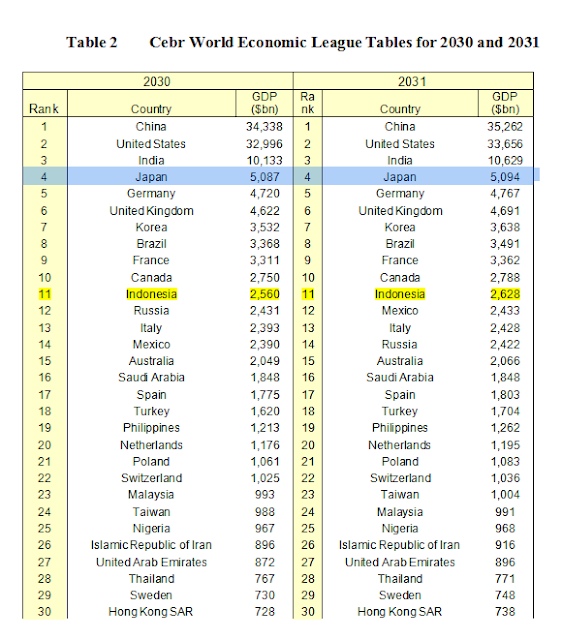- Beranda
- Komunitas
- News
- Berita dan Politik
Ekonomi Indonesia Mengalahkan Saudi Arabia Tahun 2030
TS
jokolelono101
Ekonomi Indonesia Mengalahkan Saudi Arabia Tahun 2030

Indonesia akan menjadi peringkat #11 diatas Saudi Arabia yang di peringkat #16 pada tahun 2030 . Mungkin tidak ada lagi TKI/TKW pergi kesana dan cerita TKW kena hukuman pancung tinggal kenangan
Indonesia: As Indonesia manages to continue economic reform after the change in government, fears that its impressive economic growth might grind to a standstill have proved groundless and the economy has even withstood the Chinese economic slowdown and the backlash to the US interest rate rise. Forest fires and toxic haze remain a dampener on the economy and have also affected neighbouring Malaysia. Indonesia rises from 17th position in the league table in 2014 to 11th position in 2031.
Mexico: Mexico is gradually catching up with Brazil to become the largest economy in Latin America as a result of its faster economic growth. The pace of catchup is gradual, however, and overtaking is unlikely to happen much before the middle of this century.
Italy: The world’s slowest growing major nation (no real GDP growth at all between 2000 and 2014) is likely to continue its fall down the league table and pressure for it to lose its membership of the world’s exclusive G-8 economic group is likely to prove successful since by 2031 Italy is forecast to be only the 13th largest world economy.
Russia: We forecast last time that Russia would perform badly to the backdrop of criticism from the Putin propaganda machine. In reality our only mistake was to be overcomplimentary to the Russian economy which in fact has performed even worse than we predicted. This year the country has dropped from 10th position in the world economy to 14th position which it is expected to hold over the period to 2031. The maintenance of 14th place is predicated on a recovery in the oil price and some, though limited, diversification. Even if both of these happen, Russia is likely to lose its place in the world’s G-8 group of major economies.
Australia: The forecasts show Australia dropping from being the world’s 12th largest economy in 2014 to its 15th largest in 2031. In reality, this is almost entirely due to the weakness of the world’s markets for energy and minerals over the forecast period and the underlying performance is rather better than the position in the league table suggests. Meanwhile the changing ethnic composition of the population, despite strict migration controls, means that the ‘we’re off to the beach’ attitude to working of many urban Australians will be challenged while diversity will boost creativity. In any case, Australians can take comfort from the fact that Cebr’s statistical research confirms that the performance of its national cricket team is negatively correlated with the economy http://www.gresham.ac.uk/lectures-an...orrelated-with
Saudi Arabia: The outlook for the Saudi economy is heavily based on the outlook for oil. As oil prices are forecast to pick up from their current lows we forecast an improvement in Saudi Arabia’s global rank on the WELT. However, as prices are expected to remain relatively weak with any improvement fairly marginal, and given Saudi Arabia’s poor performance when it comes to diversification, our forecast for the level of its GDP in dollar terms is actually lower than what was expected in last year’s report.
Spain: The Spanish economy is forecast to slip down the table from 13th place in 2014 to 17th in 2031. This reflects the broader trend of slower growth in Western Europe but also particular structural hurdles in Spain’s economic development such as the ‘hangover’ from the crisis in the form of high unemployment and skills decaying, especially among the youth. But Spain is still likely to perform better than France or Italy and will eventually replace Italy as the largest economy in Southern Europe.
Turkey: Turkey’s rank is expected to stay flat at 18. On the one hand, strong demographics and closer economic relationship with Europe should help support its development. However, at the same time political instability and geopolitical uncertainty in its neighbourhood will weigh on performance.
Philippines: The economy of the Philippines is expected to see one of the most impressive moves in the WELT, from 40th place in 2014 to 19th place in 2031. Despite some recent hits from severe natural disasters, the fundamentals of strong demographics, a force for urbanisation, and close links to the US and the rest of ASEAN should help it see rapid development.
Cebr Global’s World Economic League Table (WELT) is an annual calculation by Cebr Global, Cebr’s global economic consultancy. The base data for 2014 is taken from the IMF World Economic Outlook and the GDP forecast draws on Cebr’s Global Prospects model to forecast growth, inflation and exchange rates.
The Global Prospects Report is a quarterly report every three months. The report is part of The Prospects Service – Cebr’s macroeconomic advisory package for business.
Cebr Global is a leading independent commercial economics consultancy based in London. The report has been co-authored by the Cebr staff.
For more information, please contact:
Danae Kyriakopolou +44 (0) 7812 540 030 or +30 6945 890 792 email dkyriakopolou@cebr.com
Danae Kyriakopolou +44 (0) 7812 540 030 or +30 6945 890 792 email dkyriakopolou@cebr.com
Alastair Cavalla +44 (0) 7845 361 402 email acavalla@cebr.com
Contact
Tel: +44 20 7324 2850
Email: enquiries@cebr.com
Enquiry form
Unit 1
4 Bath Street
London
EC1V 9DX
United Kingdom
Map
SUMBER :
http://www.cebr.com/reports/welt-2016/
Diubah oleh jokolelono101 11-05-2016 02:03
0
2.5K
16
Komentar yang asik ya
Urutan
Terbaru
Terlama
Komentar yang asik ya
Komunitas Pilihan